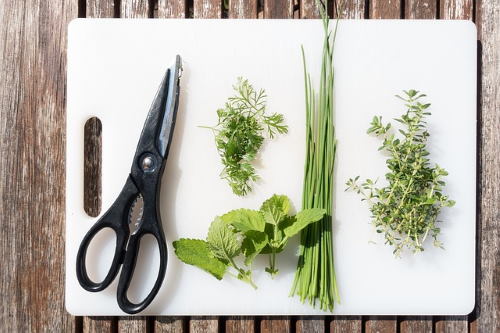Harvesting Herbs
Knowing a few things about harvesting herbs will help you to capture their best flavors and aromas.
Best Time for Harvesting Herbs
Herbs should be harvested when essential oils are at their peak. By harvesting herbs first thing in the morning, you'll capture their essential oils -- the quality that gives herbs their flavor and fragrance -- before the sun's heat dries it up.
 Snip herbs as you need them throughout the growing season.
Snip herbs as you need them throughout the growing season.Mature culinary herb plants should be pinched or cut back frequently so you'll get a steady supply of tender branch tips. If you use your herbs often, you're automatically doing this. Pinching also prevents herbs from flowering and setting seeds. This gives plants a second growth of leaves that will provide you with fresh herbs in autumn and winter.
Annual herbs will not grow new leaves after they have gone to seed. So, unless you're planning to collect the seeds, pinch off flower stems as soon as you see them to prolong the plant's life.
How to Harvest Herbs
Use sharp scissors when harvesting herbs with woody stems. Tearing at stems will leave ragged edges that can harm the plant and attract disease. Herbs with soft stems can be pinched off.
Cut just above a node -- the small bump or joint where a stem branches out. New growth is produced from nodes, so by cutting them here, you'll encourage new growth and branching. Even if you just want the leaves, cut the whole stem before stripping away the leaves. Remember to cut long stems if you're planning to hang the herbs to dry.
How much should you harvest? Allow perennial herbs to grow during the first year before heavy harvesting. Trim them lightly to promote branching of stems so you'll get a fuller, bushier plant. Once they're established, you can take up to half of the plant at a time without weakening it.
Since you'll only get one season of growth from annual herbs, you'll want to harvest as much as you can during the growing season. The same is true for biennial herbs, such as parsley.
Quick Storage Solutions
Herbs begin to wilt shortly after cutting, so you'll need to store them right away.
If you plant to use herbs while they're fresh, put their stems in a little water just like flowers. Don't wash the herbs first -- wait until you're ready to use them.
Soft-stemmed herbs -- parsley, basil and cilantro -- will stay fresh this way for up to a week.
Rosemary and thyme can be stored in your refrigerator's vegetable bin for several days. Wrap them in a damp paper towel, then put them in an open plastic bag. (Keep the bag open so that moisture doesn't build up and cause the herbs to get mushy or moldy.)


